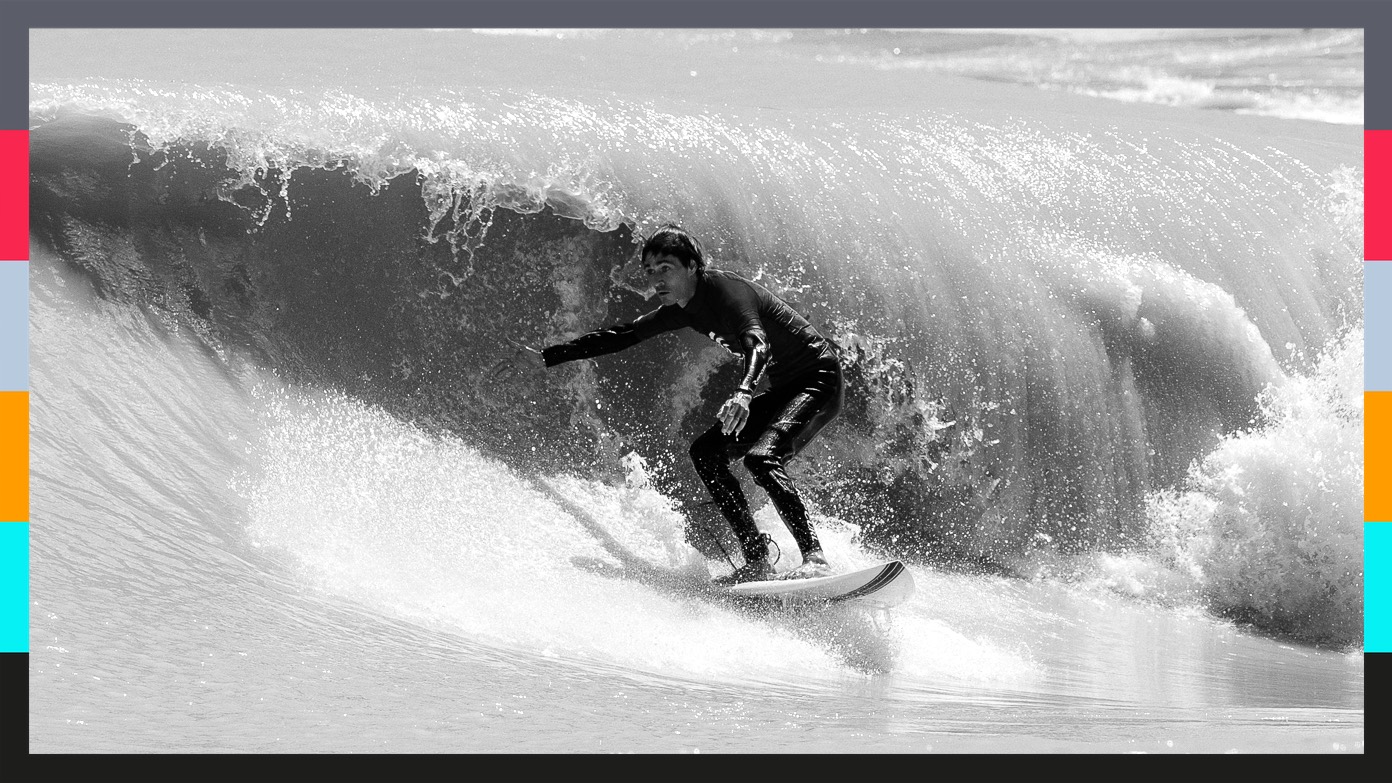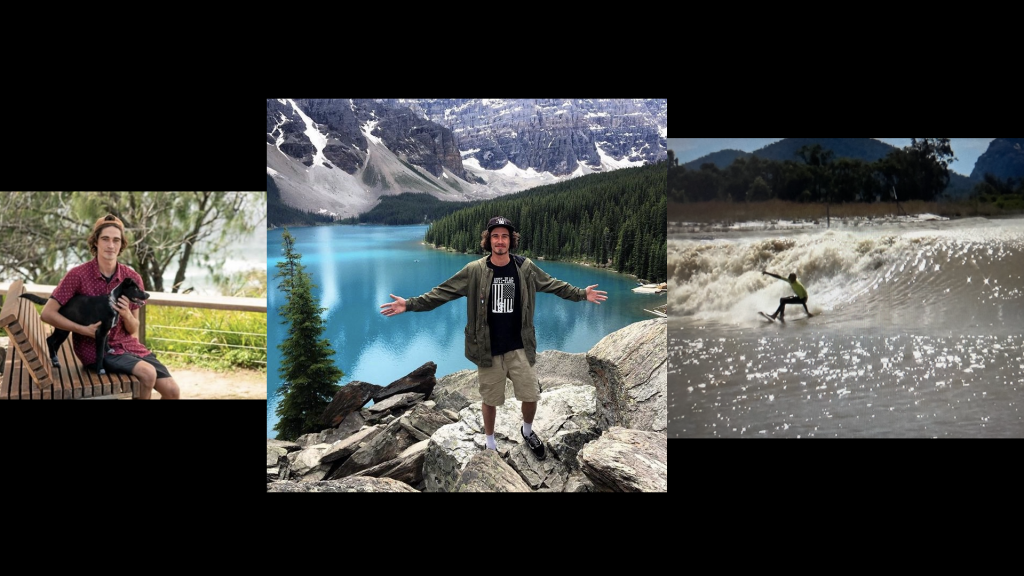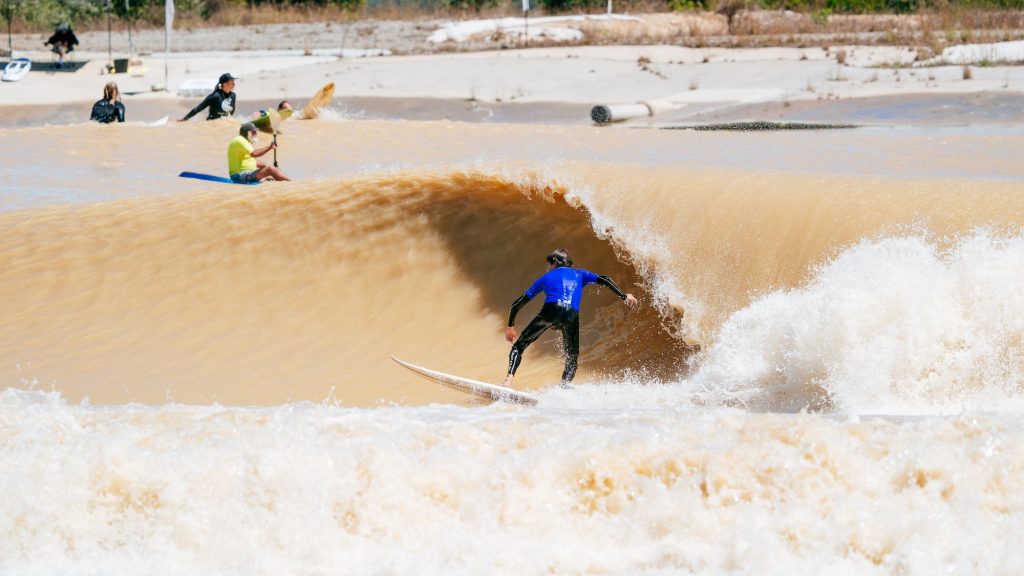Wave Pools offer respite from the weight of Multiple Sclerosis

Surf stoke is real. Pretty much anyone who’s ever ridden a wave can attest to this. But for Joe Pradella, a lifelong surfer, snowboarder, and skateboarder, a Multiple Sclerosis (MS) diagnosis at 25 brought on a cataclysmic life change.
His life quality has suffered, but having access to artificial waves has seen him physically and mentally rebound.
MS comes in varying degrees of severity but is always life-changing. In a nutshell, it disrupts the flow of information within the brain and between the brain and body impacting the spinal cord and central nervous system – which controls all of our motions.
Joe’s story is brutally honest. From boardrider and renegade bon-vivant – with associated excesses, and from brutal injury to MS diagnosis and hope in the form of man-made waves. Here’s Joe’s story in his own words…

I was born, raised, and learned to surf in Noosa Heads in South East Queensland, Australia. I grew up around the surfing/logging community, and my dad was a founder of the Noosa Malibu Classic, the forerunner to the Noosa Festival of Surfing. It’s an ideal spot to be a surfer, I started when I was four, and we have renowned points and incredible stretches of beach breaks.
In November 2018, Cyclone Oma hit our coastline, and the points were pumping. Hundreds of surfers were out there, dodging each other and hustling to get a wave at the Boiling Pot (one of Noosa’s more hollow point waves), so I ran around to Tee Tree Bay, the next point up, jumped in, and drifted in front of the cliff face into a spot called Eno’s, between Tee Tree and the Pot. It’s a short, hollow, thumping ride, with exits far from guaranteed, but these factors mean fewer people in the water. I took off on a pretty heavy close-out and hit my head on what felt like a rock. I brushed it off, didn’t think much of it, and paddled in with half a board.
A week went by and a mate and I were going for a wave, and I felt faint like I had a bit of a numb forehead but brushed it off. A couple of days went by, and the numbness became more intense and was moving down the right side of my face. A doctor told me I may have just pinched a nerve, and the symptoms should disappear in time. A couple of weeks went by, and it just got worse, to the point of numbness you get from a needle-happy dentist.
I ended up back at a doctor and was booked in for a Magnetic Resonance Imaging (MRI) scan. When the morning came, I felt really on edge, my face was numb, and I could feel it creeping down my neck.
When I was getting my MRI, there was a little mirror inside the machine, and I could see the radiologist at the computer monitoring my scan. He then brought in a second person, and I could see them pointing to the screen, which gave me a bad feeling that something wasn’t right.
Joe Pradella
Being 25 at the time, I was shit scared. My doctor greeted me, and from the look on his face, I knew something was wrong. My mum was sitting outside in the waiting room, and we had talked about the potential of it being MS, but we highly doubted it, as I was fit and healthy. My doc said, “I have good and bad news. The good news, you have chlamydia, which we can easily cure. The bad news is your MRI shows that you have many lesions on your brain, and we think it’s Multiple Sclerosis.”
I sat there, emotionless, wide-eyed, and said, “you’re kidding me, right?” But it was pretty much a sure thing because of the state of the lesions. I walked out of the room and looked at my mum; she knew something was up as soon as she saw my face.
About four months after my initial MRI, when I received my official diagnosis from my neurologist in March 2019, it was confirmed. I had Relapsing-Remitting Multiple Sclerosis (RRMS). After that, I was in shock; I didn’t know what to do or feel. I got home and cracked a beer, toked on a joint, and remember just internally repeating “Relapsing-Remitting MS” over and over for weeks. I went into a state of self-destruction for a couple of months; I was a mess. My mum, dad, and mates were worried about my well-being, and I faced an intervention from friends and family. Just seeing the look on my dad’s face really hit home for me.

It took me a good three months post-diagnosis to get back in the water, I wasn’t paddle fit, and that scared me as I was always in the water. I couldn’t paddle for an hour without the fatigue kicking in. Many people with MS have trouble regulating their body temperature. And with me, I don’t do well in the cold. So when winter came around (surf season), I struggled to stay in the water. I’d cramp up, become stiff quickly, and almost always come out with a blinding headache.
Those feelings scared me, but what frightened me the most was the thought of not being able to do what I love. I was out of the water for another six months after that and was pretty depressed; I didn’t have the urge to do anything I liked anymore.
Through my partner Christie I got onto an occupational therapist to help with neuro physiotherapy for cognitive issues and a sports physio to help get my mobility back. During this time, I was invited to Surf Lakes as part of an adaptive surf program to see what health benefits wave pools can bring.
Christie and I rented a ratty old camper van, drove 1000km up the coast to Yeppoon, home to the Surf Lakes testing ground, and arrived at perfect waves in the middle of the Aussie bush.
My goal now is to surf different types of wave pools and show others affected by MS, or mental health issues, that you can do what you love again with some perseverance.
Joe Pradella
I paddled for my first wave, thinking I was in the ocean and was rudely rejected. On the next set, I was told what to do and where to aim my board, and I got a ripper of a wave – which qualified me to surf Occy’s Peak. That afternoon was the happiest I had felt since before I was diagnosed, between the waves and the pure stoke on everyone’s faces in the water.
Surf Lakes’ motto, “everyone gets a break” is legit’. No hassling for waves, people cheering, and the fact that it’s the same perfect wave every time encourages you to push yourself to improve. It’s fantastic for beginners; you could quickly start on the most manageable wave and progress to an amateur surfing level within hours. With such a variety of breaks, it’s perfect for all surfers. That’s what is truly revolutionary about this place.
My goal now is to surf different types of wave pools and show others affected by MS, or mental health issues, that you can do what you love again with some perseverance. My first surf at Surf Lakes made me realize that life is so short, you have to overcome obstacles, and support is there if you ask for it.
Four years on, I have accepted my condition; I call it my sidekick. I feel it’s opened me up and made me a better person. I could almost say it was a blessing in disguise, as strange as that sounds.
There’s nothing more I want to do with my life than to promote and share surf stoke, to help lift people who’ve been brought down one way or another.
For someone like me and others with MS – a condition that varies in severity – wave pools are the gateway to our well-being and surfing future.
Related Coverage
